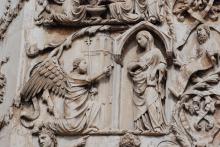I was reading part of Luke chapter 1, and was struck by the fact that Luke tells us that it was the angel Gabriel who visits Zechariah and Mary. Why did that strike me? Well, lots of angels appear in the birth narratives, and we’re not given their names. So why name this angel?
Compare the following:
- An angel persuades Joseph to proceed with his planned marriage to Mary: “But after he had considered this, an angel of the Lord appeared to him in a dream.” (Matthew 1:20)
- The shepherds see a great company of the heavenly host, but first a single angel: “An angel of the Lord appeared to them, and the glory of the Lord shone around them, and they were terrified.” (Luke 2:9)
- After the flight to Egypt, Joseph needs to know when it’s safe to return to Galilee: “After Herod died, an angel of the Lord appeared in a dream to Joseph in Egypt.” (Matthew 2:19)
None of those angels are given names, not by the biblical narrators.
Which means these two are a notable contrast.
First, Zechariah.
- He, too, has a nameless angel appear: “Then an angel of the Lord appeared to him, standing at the right side of the altar of incense.” (Luke 1:11).
- Zechariah has some trouble believing that he and his aged wife will have a son: “How can I be sure of this? I am an old man and my wife is well on in years.“ (Luke 1:18).
- So the angel reassures him: ”The angel said to him, ‘I am Gabriel. I stand in the presence of God, and I have been sent to speak to you and to tell you this good news. And now you will be silent and not able to speak until the day this happens, because you did not believe my words, which will come true at their appointed time.” (Luke 1:19-20)
Second, Mary.
- “In the sixth month of Elizabeth’s pregnancy, God sent the angel Gabriel to Nazareth, a town in Galilee, to a virgin pledged to be married to a man named Joseph, a descendant of David. The virgin’s name was Mary.” (Luke 1:26-27).
- Her response was different to Zechariah. She sought understanding (Luke 1:34), but then simply took the angel at his word: “I am the Lord’s servant, may your word to me be fulfilled.” (Luke 1:38)
Why tell us his name?
Partly, Luke is comparing and contrasting Zechariah and Elizabeth. One found it hard to believe, the other simply took God at his word. (In case you think Mary, probably a teenager, wouldn’t have the same problems conceiving as Zechariah’s elderly wife, pause and think. There is another reason why Mary would have had great trouble conceiving.) Luke stresses that the same angel visited both, to help us see the parallels.
But the parallels between these two angelic visitations are already very strong; the angel doesn’t need to have a name in order to create the parallel. So why the name?
There are only two angels in the New Testament with names: Gabriel and Michael. Both occur in the Old Testament in the book of Daniel. Both occur in the New Testament — Gabriel in Luke 1, and Michael in Jude 1 and Revelation 12.
We need to know the Old Testament in order to understand much of the New Testament properly. God did not send Jesus into a vacuum; he came in fulfilment of many centuries of action and prediction by God. Concepts such as Christ / Messiah, Lord, saviour, son of David, son of man, and so on all come from the Old Testament. In particular, Luke 1 and 2 are steeped in Old Testament imagery, with echoes of many characters from Samuel to Samson.
So when we find, in contrast to the way angels are usually introduced, that we’re told this angel’s name, and when that name is one of the two angels we’ve heard of before, we should sit up and pay attention. Luke is specifically telling us that the angel that appeared to Zechariah and Mary is the same one who appeared in Daniel 8:16 and Daniel 9:21.
In Daniel 8, Daniel has a vision of a two-horned ram, and a goat with many horns, representing the empires of Media-Persia and Greece. The focus is on a small horn that appears on the goat, representing the Greek king Antiochus IV (reigned 175-164
In Daniel 9, Daniel sets himself to pray to God for forgiveness, and to ask for God to restore the nation of Israel. She needs restoring both to her land, and to a right relationship with her God. His prayers are interrupted by the arrival of the same Gabriel, who reassures him. Daniel is deeply loved. The moment he began to pray, Gabriel was dispatched to tell him he had been heard. However, whilst there will be some movement on God’s promises in the short-term, God does not operate on our timescales. There will be a long wait before the fullness of all God has promised.
This is the Gabriel who appears to Zechariah and Mary. They meet the Gabriel who had a particular role in the past, explaining what God was going to do. More precisely, they meet the Gabriel who helped Daniel understand visions. Daniel’s visions concerned the 2nd century
For Zechariah and Mary, the message is clear: Gabriel is back. God is going to resume his promised purposes, picking up where the visions of Daniel left off. The hope that God gave to his exiled people is going to come true. That means that everything God promised his people of old, interrupted by the exile, is now going to happen.
That is a wonderful message of hope. And it’s something that would not have been said so clearly if we hadn’t been told the name of the angel in Luke 1.

Recent comments